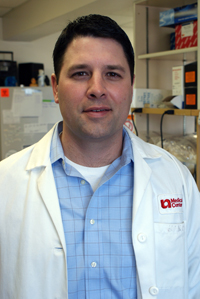 |
Paul Dunman, Ph.D., assistant professor in the department of pathology and microbiology, will receive the Gilmore Award on Tuesday at 3 p.m. in the Durham Research Center Auditorium. |
A good idea, for sure, but just an idea nonetheless.
Dr. Dunman wanted to create an antibiotic that could kill Methicillin Resistant Staphylococcus Aureus bacteria — also known as MRSA. Dr. Dunman believed certain vulnerable enzymes within the staph cells could be inactivated and this would kill the bacteria cells.
“I didn’t have an actual project in the works, just this idea, but they offered me the job anyway,” said Dr. Dunman, who worked for the pharmaceutical company, Wyeth, before coming to UNMC. “That rarely happens at academic institutions. Typically, you need grant funding to even be considered.”
But Dr. Dunman really wasn’t that much of a risk, said Paul Fey, Ph.D., an associate professor of pathology and microbiology who helped recruit Dr. Dunman to UNMC.
|
In transcriptional profiling, scientists isolate parts of a cell called messenger RNA and examine what genes are activated in various conditions.
This means scientists can see how cells respond to various elements and this can help in a variety of ways including allowing scientists to see how cells respond when exposed to medications.
His expertise in transcriptional profiling combined with his desire to create antibiotics to battle staph made him a good fit for the pathology department, which looked to beef up its already-strong team of staph researchers.
“I knew Paul from his work at Wyeth and I knew he’d fit in really well with our department,” Dr. Fey said.
He has since rewarded those who recruited him by securing several grants, including an RO1 award from the National Institutes of Health, publishing nearly 25 articles and by designing an antibiotic that has proven effective in killing all known MRSA lineages in mice.
MRSA — which has become more prominent in recent years — is responsible for more deaths in the United States each year than HIV/AIDS.
For his outstanding work since arriving at UNMC, Dr. Dunman will receive the 2009 Joseph P. Gilmore Outstanding Investigator Award on Tuesday during a 3 p.m. ceremony in the Durham Research Center Auditorium.
“Overall, Paul has been an outstanding success story since arriving at UNMC,” said Ken Bayles, Ph.D., professor of pathology and microbiology, who nominated Dr. Dunman for the award. “Quite honestly his abilities and potential are among the highest that I have ever seen.”
Dr. Dunman has several strengths that make him an outstanding researcher, Dr. Bayles said. Among these are his ability to build collaborations with scientists from multiple disciplines and institutions.
“On last count, the list totaled 25 researchers who work with him on various aspects of (staph research),” Dr. Bayles said. “His collaborative spirit has led to multiple publications with many more to follow and is reflected in the high number of visiting scientists he has hosted in his laboratory over the past several years.”
Dr. Dunman’s team building skills help galvanize the department, said Steve Hinrichs, M.D., chairman of the pathology and microbiology department.
He cited a video created by Dr. Dunman’s laboratory team for the recent “I Love UNMC” video contest as an example of this strong team spirit.
“Not surprisingly, his lab won first prize,” Dr. Hinrichs said.
Drs. Hinrichs and Bayles both said Dr. Dunman is a strong mentor to those who work under him, and they noted that graduate students and others who have worked in Dr. Dunman’s lab have secured prestigious fellowships and received awards at various conferences.
“Paul’s contributions to the department have occurred in multiple ways beyond his scientific endeavors,” Dr. Hinrichs said. “He has added to the academic atmosphere through the recruitment and training of many fine graduate students.”
Dr. Dunman takes great pride in his laboratory personnel.
“I owe so much thanks to my outstanding research team, as well as my strong departmental and university administration,” he said.
There’s another great quality about Dr. Dunman that undoubtedly has won him some fans, Dr. Fey said.
“Paul’s just a really great guy. He’s a good friend and colleague. Everybody loves to be around him,” Dr. Fey said. “I’m not surprised at all to see how successful he’s been.”